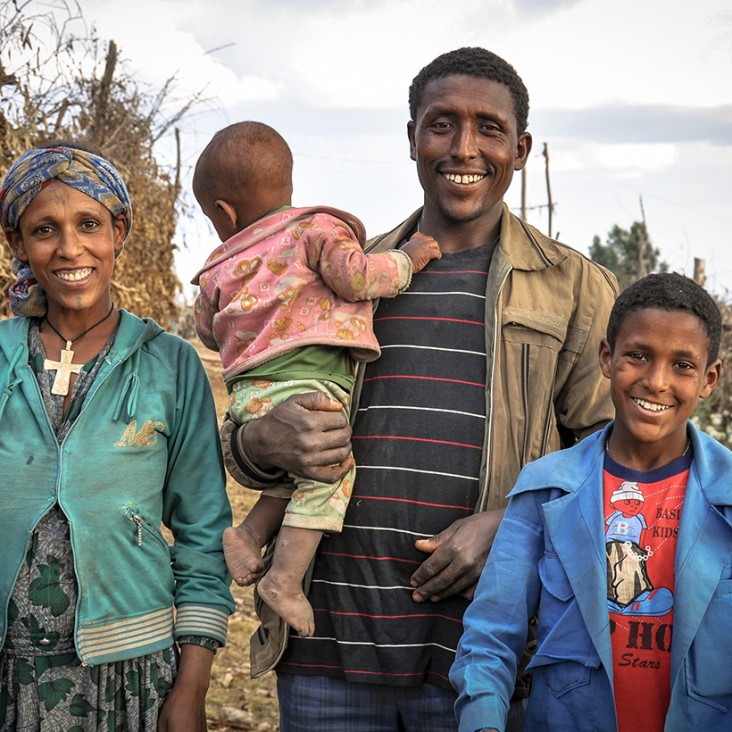Speeches Shim

Ethiopian farmer and his family end dependence on government safety net program to grasp their own brighter future
Habtamu Aragaw is a 35-year-old father of four who lives in the Amhara region of Ethiopia. Habtamu and his wife Melke Mihrete were small-scale farmers who used to rely on the government’s Productive Safety Net Program (PSNP) to survive.
“We had to receive PSNP support for six months out of the year just to feed our kids. We often did not have enough money to buy them clothing. Farming sharecropped land was far from what we needed to make ends meet,” said Habtamu.
In 2015, Habatmu and his family participated in the USAID-funded Feed the Future Graduation with Resilience to Achieve Sustainable Development (GRAD) project, where they learned how to cultivate potatoes and malt barley using higher yielding seeds and proper fertilizer techniques. They also received training in raising livestock.
Together with 16 neighboring households, Habtamu and Melke formed a Village Economic and Social Association (VESA) after joining GRAD, and received training on investing in income-generating activities, building savings, and practicing proper nutrition to improve the well-being of the whole family. Through the VESA and the GRAD project, they received improved seeds and a $300 loan to jump start their small agriculture business.
While farming was not a new concept for Habtamu, he says the training he received made a big difference. “We learned proper land preparation for malt barley, learned about short maturing crops as well as improved livestock feeding, animal health, and marketing and business skills. The market linkage with the Gonder Malt Factory and our potato cooperative helped increase our income,” said Habtamu.
Thanks to the GRAD project, Habtamu doubled his annual income, enabling him and his family to graduate from PSNP assistance and ultimately work towards a more prosperous future for his children on his own.
Today, Habtamu is confident that his family will never go back to PSNP support and can cope with any shock. They have 20 sheep and goats, enough grain to support their dietary needs for a year, and have stockpiled away more than $2,800 in savings. Ten other families from their local VESA have graduated from PSNP assistance, and 80 percent of all households who participated in the GRAD project no longer rely on PSNP support.
“I have the skills, knowledge, and savings in cash and in kind. My wife and I also support each other in livelihood activities and household chores. We’ve been able to construct a better house, eat nutritious food, and have better clothing,” says Habtamu.
About the GRAD Project
The USAID Feed the Future Graduation with Resilience to Achieve Sustainable Development (GRAD) project began in 2011 to build resilience among chronically food-insecure households in Amhara, Tigray, Oromia and SNNP regions of Ethiopia. Led by CARE, in partnership with local and international organizations, GRAD improves long-term food security by connecting families to economic opportunities, financial services, and agricultural and nutrition services to end reliance on the Ethiopian Government’s Productive Safety Net Program.
Through GRAD, families learn to invest money from loans to start small businesses and diversify their assets, helping them nearly double their annual incomes and increase savings by four-fold on average. As a result, 80 percent of families graduated from the safety net program.
Today, the Feed the Future Livelihoods for Resilience activity builds on GRAD’s success, helping many more families achieve a brighter and more prosperous future.

Comment
Make a general inquiry or suggest an improvement.